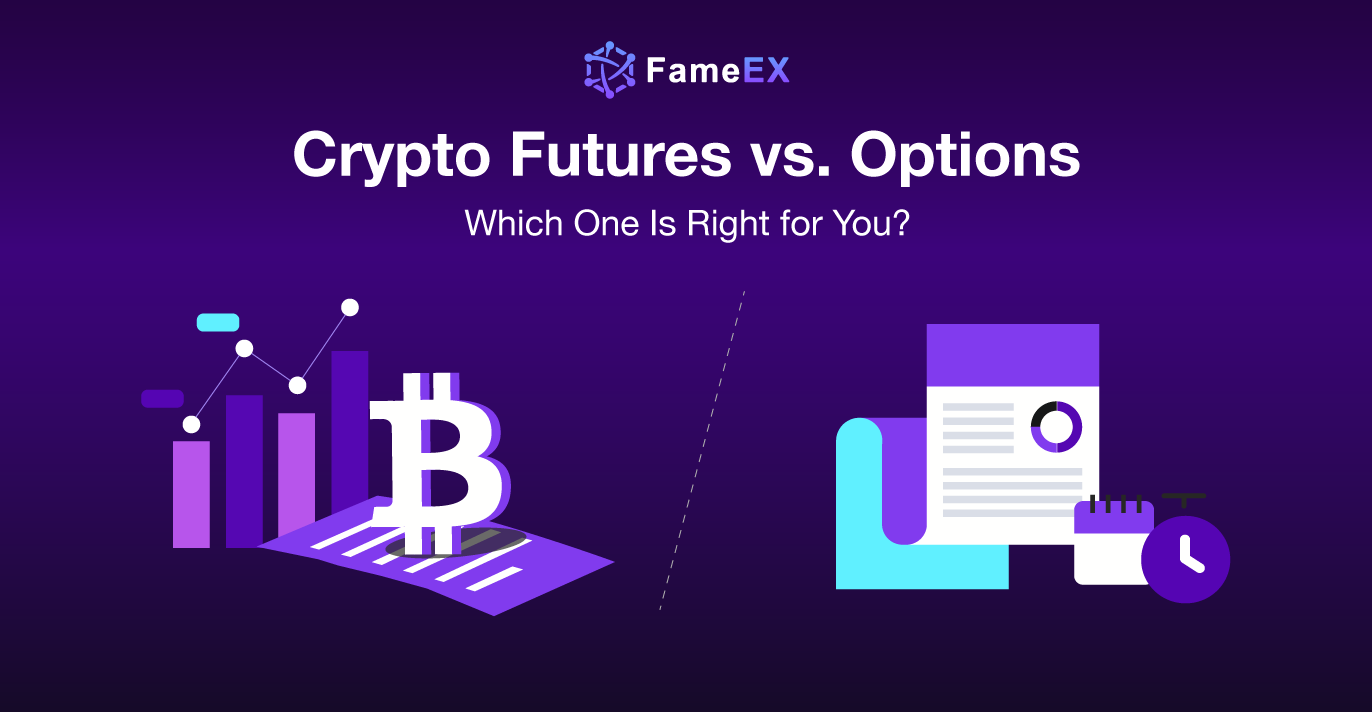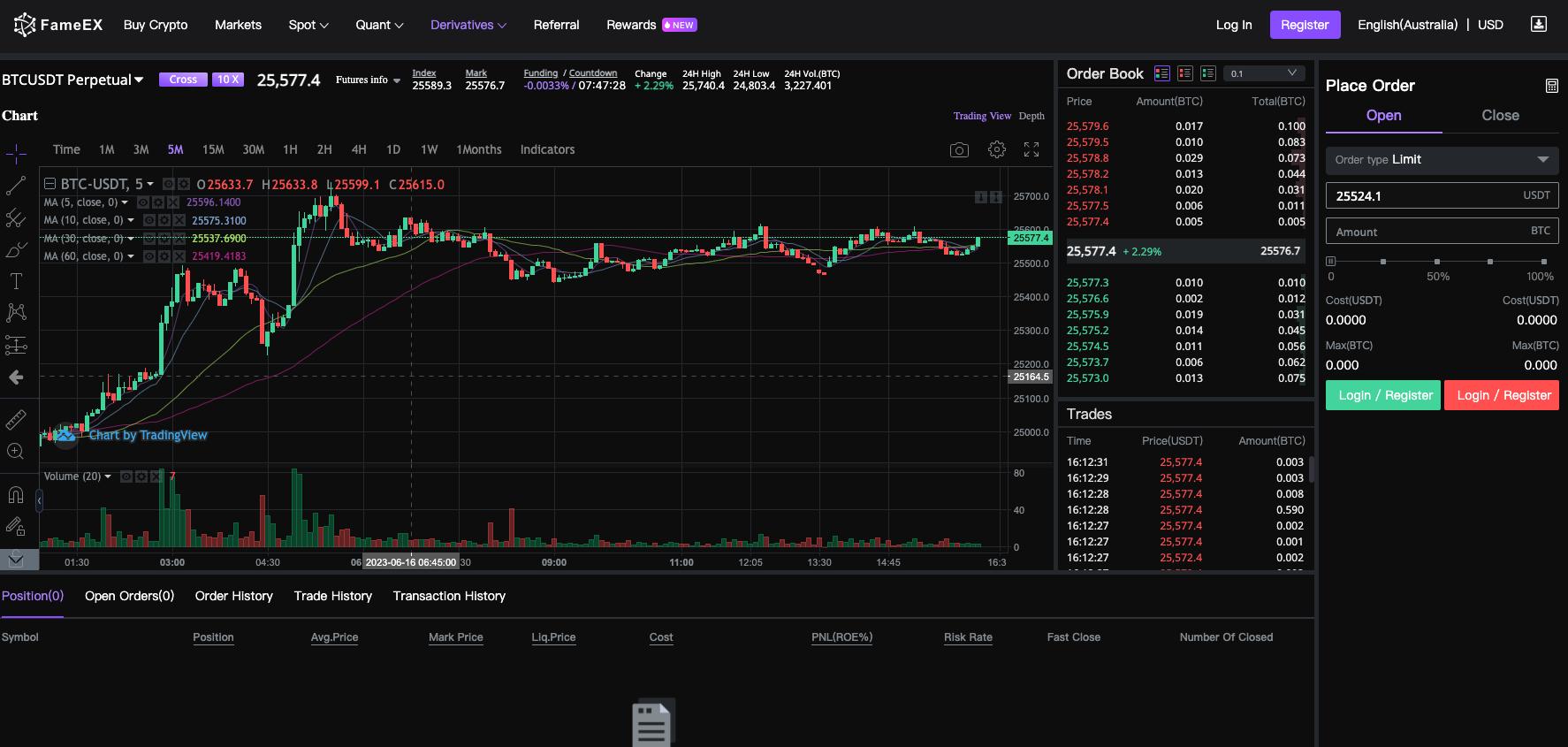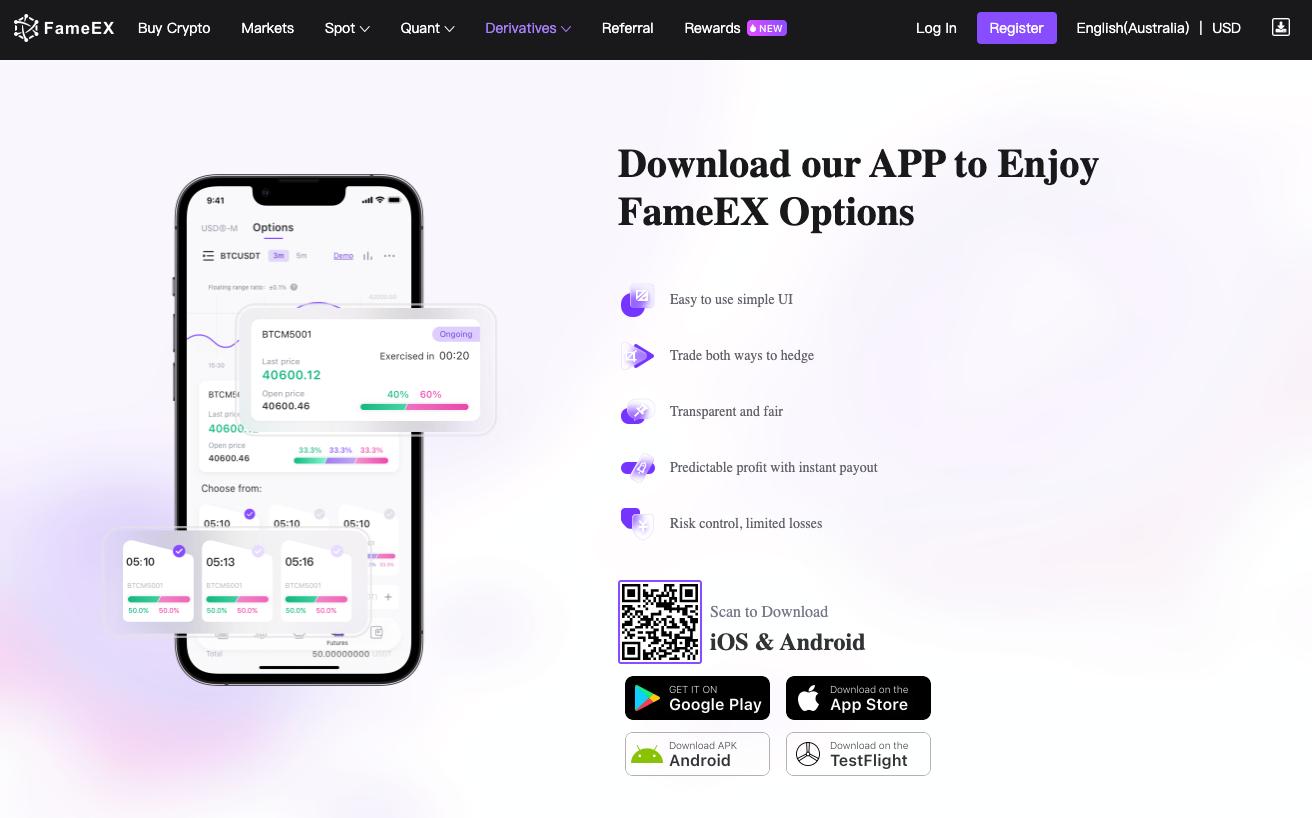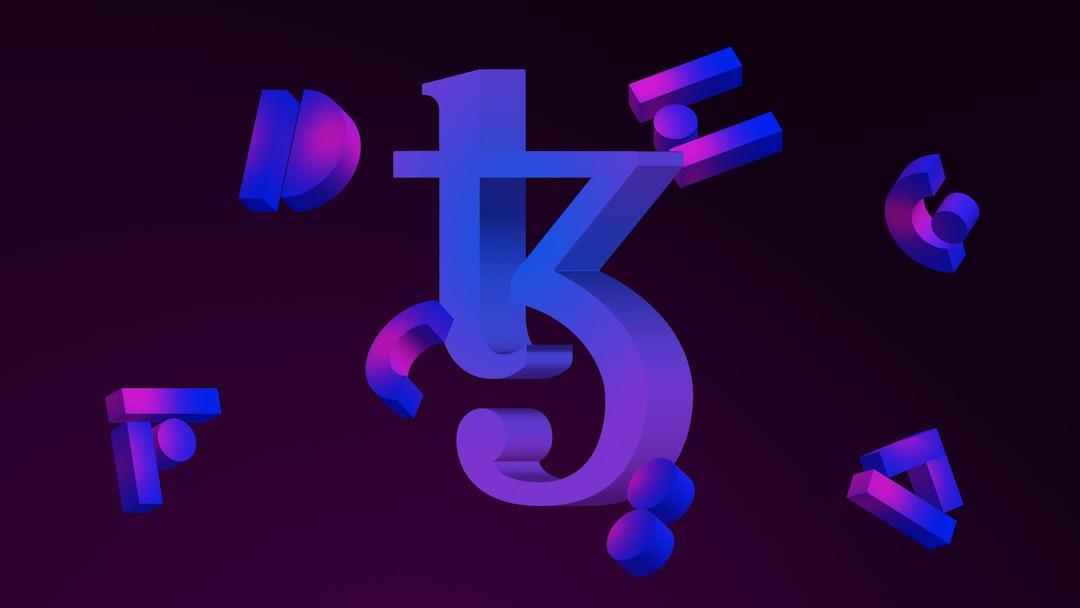Crypto Futures vs. Options: Which One Is Right for You?
2024/07/04 16:55:35
Are you looking to diversify your trading strategies and capitalize on the ever-evolving world of cryptocurrencies? With an influx of innovative financial instruments, traders and investors in Australia now have more options than ever to effectively speculate on market prices, hedge risks, and add variety to their portfolios. Two popular choices are crypto futures and options, both offering exposure to underlying assets like Bitcoin or Ethereum without the need for direct ownership. But which of these powerful derivatives is the right fit for your unique investment goals? In this article, we will explore the similarities and differences between crypto futures and options, giving you a comprehensive understanding to help you decide which approach aligns best with your trading objectives. Let's dive in and unravel the mystique surrounding these exciting financial instruments!
What are Crypto Futures Trading?
Crypto futures trading involves financial instruments known as futures contracts, where two parties agree to buy or sell a specific cryptocurrency at a predetermined price on a set date in the future. These contracts allow Aussie traders to speculate on the price movement of various digital assets, such as Bitcoin, Ethereum, and other altcoins. Some key points to consider about crypto futures trading include:
1. Crypto futures contracts can represent the value of a specific cryptocurrency at a specified time, allowing traders to make informed decisions based on market trends and predictions.
2. These contracts allow traders to take long or short positions, depending on their market analysis. Taking a long position means anticipating a price increase, whereas a short position is taken when expecting a price decrease.
3. The trading of crypto futures enables investors to gain exposure to cryptocurrencies without directly owning the underlying assets, reducing the risks associated with the actual purchase and storage of digital assets.
Types of Crypto Futures Contracts
In the ever-evolving cryptocurrency market, various types of crypto futures contracts have emerged to cater to the diverse needs of traders in Australia. These contracts play a crucial role in managing the risk associated with cryptocurrency investments and providing an opportunity to hedge or speculate on the market. Standardized futures contracts and perpetual contracts are two main types of crypto futures contracts:
1. Standardized Futures Contracts: These are the most common type of futures contracts that stipulate the quantity, delivery date, and price of an underlying asset. Traders use standardized contracts to predict the future value of cryptocurrencies and decide whether to go long or short.
2. Perpetual Futures Contracts: Unlike regular futures contracts with an expiry date, perpetual contracts have no expiration date and can be held indefinitely. Traders can benefit from the price movements without worrying about contract expiration.

FameEX Perpetual Futures
3. Customized Futures Contracts: Tailored to meet the specific requirements of a Aussie trader, customized contracts allow the negotiation of contract terms between the buyer and seller. These contracts provide more flexibility than standardized contracts but may carry higher risks due to the lack of standardization.
4. Margin Trading Futures Contracts: These contracts allow traders to use leverage and borrow funds from exchange or broker to invest in a larger position. While this can amplify gains, it also magnifies potential losses.
In summary, crypto futures trading allows investors and traders to speculate on the price movements of different cryptocurrencies using futures contracts, providing them with a way to hedge risks and potentially profit from market fluctuations.

What are Crypto Options Contracts?
Crypto options contracts are a type of financial derivative that have been growing in popularity within the digital currency market. A crypto options contract is a specific form of financial instrument where investors can buy derivatives based on an underlying digital asset, such as a cryptocurrency. These options come with a specific expiry date and/or time, and the investor makes a profit if the price of the underlying asset is on the intended side of the set strike price when the contract expires. FameEX options trading is a variant of options trading where cryptocurrencies serve as the underlying assets. With FameEX options, investors generate profit by accurately forecasting the price movement of these digital assets, in relation to the initial price, by the contract's expiry time. Here are some key points about crypto options contracts:
- • Unique structure: Crypto options contracts come in two distinct styles: American options, which can be exercised at any point before expiration, and European options, which can only be exercised at the moment of expiration.
- • Flexible for the investor: These contracts give the buyer the right (but not the obligation) to buy or sell an asset at a predetermined price on or before a specified date. This feature makes them less risky compared to crypto futures, where there is an obligation to fulfill the contract.
- • Call and put options: Depending on the market conditions and investor's outlook, a Australian trader can choose to purchase call options (if they believe the asset's price will rise) or put options (if they think the price will fall).
- • Premiums required: To enter into a crypto options contract, a premium must be paid, which is an additional cost for the investor.
- • Exposure without ownership: As mentioned earlier, options contracts allow traders in Australia to speculate on price movements of cryptocurrencies without needing to own any of the assets, reducing their overall risk exposure.
In summary, crypto options contracts offer an attractive alternative for investors looking to participate in the volatile cryptocurrency market by limiting their risk and providing flexible investment options.

Trade FameEX Options on the app
When to Use Crypto Options?
Crypto options serve as valuable tools for Aussie traders seeking greater flexibility and control over their investments. These options empower traders to predetermine a specific price for buying or selling an asset, with the option set to expire on a designated date. Utilizing crypto options can be a strategic maneuver for investors aiming to manage risk, speculate on market shifts, and capitalize on unpredictable market conditions.
However, it's important to note that crypto options tend to be more complex than futures contracts and require advanced knowledge about financial derivatives trading. As such, they may not be suitable for novice traders or those who are risk-averse.
Overall, whether you choose crypto futures or options will depend on your investment objectives, trading experience level, risk tolerance and other factors unique to your situation. Be sure to carefully consider all of these factors before making any decisions about your portfolio.

Crypto Futures vs. Options: The Similarities
1. Derivative instruments: Both crypto futures and options are considered derivative contracts as they derive their value from their underlying assets, such as cryptocurrencies, stocks, or commodities.
2. Risk management tools: Traders in Australia use both futures and options to manage risk and protect their investments from market fluctuations, particularly in the highly volatile cryptocurrency markets.
3. No direct ownership: With both futures and options, traders do not directly own the underlying asset. This feature allows them to profit from price movements in the crypto market without ever owning any cryptocurrency.
4. Tradable contracts: Both options and futures contracts can be bought and sold on exchanges. Traders can close their positions ahead of expiration, allowing for increased flexibility in their trading strategies.
5. Exposure to various assets: Crypto options and futures provide traders with exposure to numerous cryptocurrencies, allowing them to diversify their portfolios and hedge against market risks.
6. Market speculation: Both instruments are frequently used for speculative purposes, as traders can profit from predicting accurate price movements of the underlying cryptocurrency assets.
7. Influenced by market factors: The value of crypto futures and options contracts are affected by similar market factors, such as supply and demand, market sentiment, and economic or geopolitical events.
8. They both require a margin deposit from traders: This means that traders need to have a certain amount of funds in their account before they can open a position.
Crypto Futures vs. Options: The Differences
1. Definition: Crypto options provide the right, but not the obligation, to buy or sell a cryptocurrency at a predetermined price before a specific expiration date. Crypto futures, on the other hand, are contracts that require the buyer to purchase or the seller to sell a cryptocurrency at an agreed-upon price when the contract expires.
2. Premiums: Options contracts require a premium payment, while futures contracts don't involve any upfront payment.
3. Obligation: In options trading, you have the option to buy or sell, whereas in futures trading, there's an obligation to fulfill the contract terms.
4. Risk management: Options offer more flexibility in risk management, as you can choose to exercise the contract or let it expire. With futures, you're committed to the contract, making them riskier.
5. Profit opportunities: Both options and futures can be profitable ventures, depending on market conditions and the trader's strategy. However, options offer limited losses (premium payment), whereas futures can lead to potentially unlimited losses.
6. Expiry styles: Crypto options come in two styles - American (can be exercised at any time before expiry) and European (can only be exercised on the expiry date). Futures contracts, on the other hand, have a single expiry date.
7. Types: Crypto options include call (right to buy) and put (right to sell) options, while futures contracts involve just one type of agreement.
Overall, the major differences between crypto futures and options revolve around the level of obligation, risk management, and contract flexibility. It's crucial for traders to understand these differences before diving into these financial instruments to make informed decisions.
Should You Trade Crypto Futures or Options?
Deciding whether to trade crypto futures or options depends on your investment goals, risk tolerance, and trading experience. Both of these financial instruments offer exposure to cryptocurrencies without the need for ownership, allowing investors to speculate on market prices, hedge risks, and diversify their portfolios. Here's a quick summary to help you make an informed decision:
Risk Tolerance: Understanding Your Appetite for Risk
When considering whether to trade crypto futures or options, one crucial factor to keep in mind is your risk tolerance. Risk tolerance varies from person to person, but it helps to identify your comfort level with potential losses when it comes to your investments. Some key aspects to consider include:
- • Financial situation: Assess your current financial health and stability, including your saving and income sources, to determine how much risk you can afford in trading.
- • Investment time horizon: The length of time before you need to access your funds can impact your risk tolerance. A long investment horizon typically allows investors to take on more risk, while a shorter one requires a more conservative approach.
- • Personal temperament: Reflect on your own personality and how it affects your ability to handle the emotional aspects of investing. Are you an aggressive investor who can stomach considerable ups and downs, or do you prefer steady, gradual growth?
In trading crypto futures and options, each instrument carries its own level of risk. As identified in the factual data, options generally have a lower risk profile compared to futures, since the maximum loss is limited to the paid premium. However, it suggests that futures contracts may be more attractive to risk-tolerant investors, thanks to their increased liquidity, leverage, and simplicity in pricing. Ultimately, understanding your risk tolerance can help you make an informed decision when choosing between trading crypto futures or options.
Trading Experience
Crypto derivatives, such as futures and options, present a world of opportunity for investors who learn how to navigate them. Both instruments come with a multitude of benefits and risks, making it crucial to possess a solid understanding of these markets. Here are a few aspects to consider:
- • Future price predictions: Crypto futures provide Australian traders with the ability to hedge against future price fluctuations, capitalizing on the anticipation of the underlying asset's value, whether it moves higher or lower. Options, on the other hand, provide investors with more flexibility, allowing them to exercise their rights to buy or sell the asset at a specified price before the contract's expiration.
- • Risk exposure: While futures contracts are typically marked-to-market daily, which helps limit potential credit risk, options trading allows investors to limit their losses to the initial premium paid for the contract.
- • Level of expertise: Crypto futures and options trades generally require a higher degree of market understanding and expertise compared to traditional investments. As such, it's essential to research and learn about managing risk, navigating volatile markets, and employing strategies that suit your investment objectives.
Therefore, a trader's experience and knowledge in the crypto derivatives market play a significant role in determining the right instrument to trade. Both futures and options provide unique advantages and challenges, making them suitable for different types of investors and trading objectives.
Investment Objectives
As a potential investor in the cryptocurrency market, it is crucial to consider your investment objectives when comparing crypto futures and options. These financial instruments serve different purposes and suit different investment needs based on various factors.
- • Risk Management: Crypto futures and options serve as excellent risk management tools by allowing investors to hedge their exposures to potential market volatility. However, options contracts typically provide a more risk-averse approach since the contract buyers have the choice to exercise their rights based on market conditions. In contrast, futures contracts carry a higher level of risk as holders are obliged to buy or sell the underlying asset.
- • Leverage: Crypto futures have the advantage of providing higher leverage opportunities, allowing investors to maximize their potential gains. However, this can also amplify losses, so it's important to use leverage carefully.
- • Liquidity: Most popular futures markets are highly liquid, offering narrow bid-ask spreads and the assurance that traders in Australia can enter or exit their positions when required. Options markets can have lower liquidity, especially for contracts far from the money or with distant expiry dates.
- • Time Decay: Unlike options, crypto futures do not suffer from time decay, meaning their value does not degrade over the life of the contract.
"The choice between trading crypto futures or options ultimately depends on an individual's investment objectives, risk tolerance, and preferred trading strategies."
Real-Life Scenarios: When to Choose Crypto Futures Over Options
In real-life scenarios, crypto futures can be a better choice over options when investors want to gain exposure to the market without actually owning the underlying asset. For example, consider the following situations:
1. Market speculation: Investors who possess a strong conviction about short-term market movements can choose crypto futures to leverage their positions. They can take either a long or short position, betting on the price rise or drop of the underlying cryptocurrency.
2. Hedging: When an investor wants to mitigate the risks associated with holding a cryptocurrency, they can hedge their exposure by taking an opposite position through a futures contract. This provides a safety net for unexpected price fluctuations.
3. Liquidity: Crypto futures tend to have higher liquidity than options due to their simpler structure and larger market. This allows investors to enter and exit positions more easily and at better prices.
4. Lower premium costs: Unlike options, futures don't require the payment of a premium for the right to buy or sell an asset. This can be an advantage for investors who want to minimize upfront costs.
5. No early exercise risk: With futures contracts, there is no risk of early exercise, as there is with options. This means that investors don’t need to worry about being forced into an unfavorable position.
Overall, crypto futures can be a better choice for investors who want to take advantage of market movements, seek to increase liquidity in their portfolios, or mitigate risks associated with holding cryptocurrencies. It is important, however, to research the market and understand the potential risks associated with futures contracts before trading.
Conclusion
The choice between crypto futures and options depends on an individual's investment objectives, risk tolerance, and trading strategies. Both instruments offer exposure to the underlying cryptocurrency and serve various purposes, such as hedging risks and diversifying portfolios. Let's discuss a few crucial points:
• Similarities: Crypto futures and options are both derivative instruments that offer exposure to an underlying asset without owning it, allowing investors to speculate on market prices and hedge risks. They can also be used to diversify portfolios.
• Distinctions: Crypto futures obligate the contract holder to buy or sell the asset at a predetermined price and date. In contrast, crypto options grant the holder the right, not the obligation, to buy or sell the asset at a pre-established price and date while paying a premium.
• Crypto futures might be more suitable for traders who can handle potential losses from liquidation or incorrect market predictions. Options can be a better fit for risk-averse investors who want to minimize potential losses.
Ultimately, understanding the differences and similarities between crypto futures and options is crucial for investors and traders to make informed decisions that align with their financial goals.
FAQ About Crypto Futures and Options
Q: Who Trades Crypto Futures and Options?
Crypto futures and options are becoming increasingly popular among a wide range of investors, including individuals, institutions, and businesses. While some Aussie traders use these financial instruments to hedge their existing positions or manage risks, others use them for speculative purposes in the hopes of generating profits, each using these financial instruments for different purposes.
Q: Crypto Futures vs Options: Which Is Better for Trading?
Crypto futures and options are both popular cryptocurrency derivative products whose suitability depends on the trader's risk profile and strategy. Futures are contracts for buying or selling a cryptocurrency at a predetermined price and date, often used by institutional investors to anticipate market movements. Options, offering greater flexibility, grant the right (without obligation) to buy or sell a cryptocurrency at a set price before a certain date, posing less risk as traders can choose to exercise them or not. Thus, the choice between futures and options depends on one's risk tolerance and market analysis skills, necessitating a thorough understanding of both instruments to fit one's investment strategy.
Q: Why Crypto Futures Are Better Than Options?
Crypto futures present several advantages over options in the cryptocurrency market, which makes them an attractive choice for traders. These advantages include lower costs due to the absence of an added premium usually associated with options trading, offering more affordability and accessibility to investors. Additionally, crypto futures exhibit higher liquidity, translating into tighter spreads and faster trade execution, a benefit in the fast-moving crypto market. Moreover, futures contracts, unlike options, obligate both parties to fulfill the contract at the agreed price, providing increased certainty for traders aiming to manage risk or hedge investments. Therefore, the cost-effectiveness, flexibility, and liquidity offered by crypto futures make them a preferred trading method over options.
Q: Which Is Riskier, Crypto Futures or Options?
Crypto futures are agreements between traders to buy or sell an asset at a predetermined price on a specified date in the future. They can be beneficial for predicting price movements and taking advantage of market trends. However, futures contracts involve a higher risk, as traders are obligated to buy or sell the asset at expiry.
This is not investment advice. Please conduct your own research when investing in any project.
